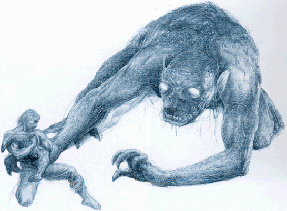Within “The Seafarer” and “The Wife’s Lament,” there are several motifs, or recurring ideas, that appear frequently in many Anglo-Saxon works. In “The Seafarer, the three main motifs appear to be exile, journey, and fate. There is a sailor in “The Seafarer” that is all alone in the vast ocean, running away from the land for unknown reasons. “It tells how the sea took me, swept me back and forth in sorrow and fear and pain, showed me suffering in a hundred ships, in a thousand ports, and in me” (l 1-5). Although it is unknown why the sea-man was exiled and avoided the land at all costs, he suffered at sea, punishing himself for some nameless act or deed he had done as a youth. As the sailor makes his journey as an adult, he continually ponders about his life at sea. “And how my heart would beat, knowing once more the salt waves tossing and the towering sea! The time for journeys would come and my soul called me eagerly out, sent me over the horizon, seeking foreigners’ homes” (l 33-38). He feels the adrenaline and the possible dangers of being at sea, the waves able to crash their ship and kill them all at any moment in time. However, the sailor is making a journey, not only to escape his past, but to build a new future for himself that he can live with without guilt. Finally, it is said that “fate is stronger and God mightier than any man’s mind…Praise the Holy Grade of Him who honored us, eternal, unchanging creator of earth” (115-124). In other words, in “The Seafarer,” the man is with only his fellow seamen and their lives are in the hands of God and his decisions in the harsh, unforgiving sea. It was fate that led the sailor to sea, to escape his past by exiling himself to sea, and the journey towards a new future.
In “The Wife’s Lament,” there were many motifs that surfaced, such as exile, betrayal, grief and loss. Within this poetry, a wife tells her story of how she and her husband were separated. “A friendless exile in my sorry plight, my husband’s kinsmen plotted secretly how they might separate us from each other that we might live in wretchedness apart most widely in the world: and my heart longed” (l 10-14). This is both exile and betrayal. Her husband’s kinsmen forcefully drove her and her husband apart, thus betraying the trust that kinsmen form with one another. Another example of exile, along with the grief that comes along with it, is the wife crying that “Since my dear lord is outcast, far off in a distant land… my weary hearted lord must suffer pitiless anxiety” (l 47-52). Not only does she miss her husband dearly, but he has been sent far away from her, exiled to a distant land where they cannot see one another for ages. This loss leads to even more loss, for when the wife loses her husband, she soon learns that she lost his love and her way of living as well. “All that has changed and it is now as though our marriage our love had never been, and far or near forever I must suffer the feud of my beloved husband dear… Old is this earth-cave, all I do is yearn… Full often here the absence of my lord comes sharply to me” (l 24-34). Even without her husband’s love, the wife still yearns for his company and companionship while grieving the loss of love that never was.

No comments:
Post a Comment